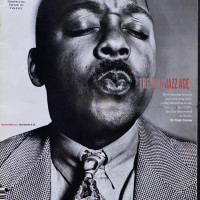-
Pulitzer Prizes Hit a New Note
Jazz got a Pulitzer for the first time yesterday when Wynton Marsalis got the prize for “Blood on the Fields,” an oratorio that follows the agonizing journey of two slaves, Jesse and Leona, from capture and the terror of the Middle Passage to their sale in a New Orleans marketplace and into the hardships of plantation life. Keep reading »
-
Wynton Marsalis has turned the hardships of slavery into sublime jazz
A three-hour oratorio about the history of slavery where the audience comes out whistling the tunes has to count as some kind of a triumph. Blood on the Fields by Wynton Marsalis - who wrote both the music and the libretto, and who performs the work at the Barbican on Tuesday with his Lincoln Centre Jazz Orchestra and the three featured vocalists of John Hendricks, Miles Griffith and Cassandra Wilson - is an extraordinary achievement by any standards. Keep reading »
-
A Conversation with Wynton Marsalis
At 35, Wynton Marsalis already has more accomplishments behind him than most musicians do in a lifetime. Since he first began recording with his own band in 1982, the New Orleans-born trumpeter has put out some 30 albums, won Grammy Awards in both the classical and jazz fields, [and has] performed in countless clubs and concert halls around the world. A passionate teacher as well as a performer, Marsalis has preached his musical message to thousands of young people via master classes, seminars, radio and TV shows. As Artistic Director of Jazz at Lincoln Center since 1987, he has helped bring jazz into the cultural mainstream and burnished its respectability as America’s only native art form. Keep reading »
-
Marsalis’s ‘Blood’: The Spirit Moves It
It’s not the ambition of Wynton Marsalis’s “Blood on the Fields” that’s astounding, but the composer’s assurance in addressing the shameful institution of American slavery. Keep reading »
-
Marsalis’ Gamble
With a cast of roughly two dozen musicians, a running time of nearly three hours and a forthcoming recording that will fill a three-CD boxed set, it is the single biggest project of Wynton Marsalis’ career to date. Keep reading »
-
Tapestry in Jazz
Wynton Marsalis looked uncharacteristically apprehensive when he stepped on stage at the Dorothy Chandler Pavilion Thursday night. “I’m nervous,” he acknowledged, looking out at the audience still streaming into seats for the West Coast premiere of his jazz oratorio, “Blood on the Fields.” Keep reading »
-
The Freedom to Create
Wynton Marsalis learned plenty while writing ‘Blood on the Fields,’ a jazz oratorio reflecting on the slave era. But perhaps the most important lesson was about himself. Keep reading »
-
Wynton Marsalis Presents His Spin on World of Jazz
“Jazz,” Wynton Marsalis says in the opening scenes of Bravo’s “South Bank Show,” “prizes individuality. It teaches you how to project your personality, and how to discover the positive and negative things about yourself.” Keep reading »
-
Stop Nitpicking a Genius

IN THE OLD MASONIC HALL BEING USED AS A RECORDING STUDIO, WYNTON Marsalis tells the band to take a 10-minute break, steps down from the podium, comes over and gives me a hug. We sit down in the old theater seats. Keep reading »
-
My home is the road
Take your time.” That’s what Wynton Marsalis always says to the musicians on his bandstand. At a New York City recording session) for his acclaimed big-band suite, _Blood On The Fields_, he reminds vocal soloist Miles Griffith to do just that during the work’s moving climax. Keep reading »
